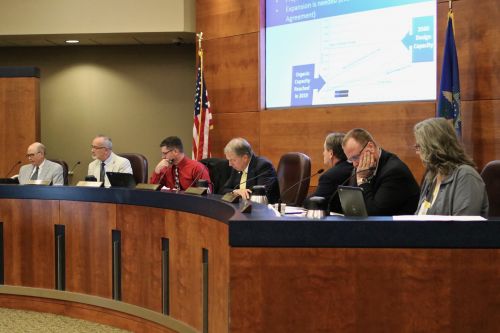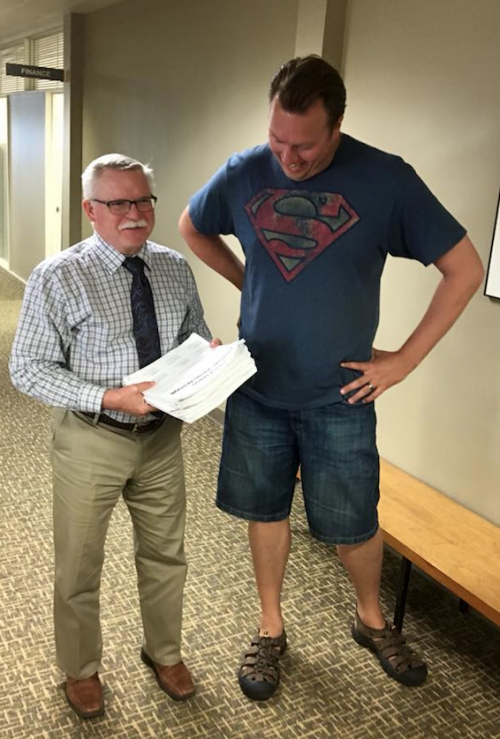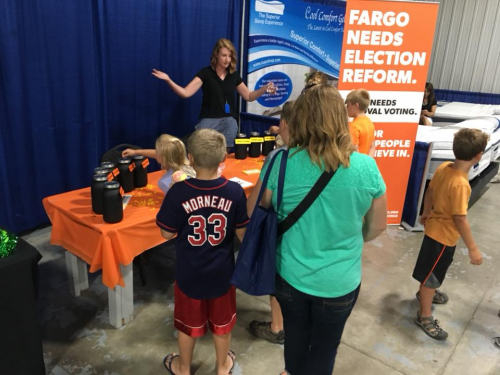News | August 27th, 2018

FARGO – Seven coworkers want different pizzas for lunch; three want cheeseburgers. Under the current voting system, burgers win.
Seem fair? Not exactly, said Jed Limke, the man who began the Approval Voting Army. On Monday, City Auditor Steve Sprague alerted the City Commission that approval voting passed inspection and will be voted on as an initiated measure this November.
The current voting system, called regular plurality voting, is a centuries-old system allowing voters to cast one vote for a favorite candidate, and winner takes all. It’s an easy to understand hand-me-down from British colonial rule, and long before the creation of automobiles earned the moniker “first-past-the-post” for describing how much land a legislator could cover on horseback.
Approval voting is also easily understood, and would select the most-approved candidate. A voting ballot would list the candidates running for each contested seat, and next to each name would be a check box marked ‘yes’ or ‘no.’ Every voter can choose to support one, some, or all candidates for any post, and the final tally would reveal who was the most popular candidate.
 “Approval voting is a more responsive way we can elect our government,” Limke said. “What happens right now is that lots of people have good ideas, but if they all run, they become victims of their own popularity. What we need is a better voting method so we can have a better government.”
“Approval voting is a more responsive way we can elect our government,” Limke said. “What happens right now is that lots of people have good ideas, but if they all run, they become victims of their own popularity. What we need is a better voting method so we can have a better government.”
Limke was first appointed by the City Commission to a task force to study election reform two years ago. Approval voting was the task force’s recommendation, but City Commissioners did not act on the proposal, which was turned into a ballot initiative before the commission race in June.
The city’s recent primary election, more pointedly the race for two seats on the City Commission, shows how approval voting could benefit voters, Limke said. In Fargo, population 115,800, only 12,184 people voted in the primary and in Cass County, population 177,787, only 22,254 people voted. No candidate received the majority of the popular vote.
For the last City Commissioner’s race Tony Gehrig received 3,998 or 17.97 percent of the votes, Dave Piepkorn received 3,683 or 16.55 percent across the county, and on their heels only a few percentage points behind came Linda Boyd, Arlette Preston, Michael J. Williams, and Tim Flakoll, according to the North Dakota Secretary of State’s office.
“To win you have to have broad support from the community,” Limke said. “One artifact in our current system is that is too common for people to win who don’t have broad support.”
Candidates run on similar platforms, thereby splitting the vote. Approval voting will help ensure votes better reflect the pulse of the community, Limke said.
Critics say approval voting hurts voters who approve of additional candidates beyond their favorite, meaning more votes will lessen the gap between new candidates and the more-preferred candidates.
Other critiques say approval is unconstitutional according to the U.S. Supreme Court ruling in the Equal Protection Clause of the Constitution.
Proponents of approval voting say that such a method would encourage more people to run for office, for it could change the dynamics of an election with any candidate having less than 50 percent of the popular vote.
Less known candidates will be given a fairer shake.
Today, institutions such as the United Nations use approval voting to elect its secretary general. Hundreds of thousands of national U.S. political party members, organizations, universities, and the Cardinals of the Catholic Church, also use approval voting.
The concept has been gaining traction across the United States, and if the measure passes in Fargo, the city will be the first in the nation to change.
Limke hopes the concept will become a reality in Fargo, then his goal is on to the county, the state, and hopefully, one day, the nation.
Critics of first-past-the-post voting method say the system is easily gerrymandered, and all votes not in favor of the winning candidate are considered wasted votes. Some critics say that the current voting method can lead to distorted representation, since party support is often linked to geography. Popular parties can find themselves without elected representation leaving their supporters unrepresented.
Small parties also draw votes away from a larger party, giving advantages to any less similar party under first-past-the-post method.

If approval voting is passed by the general vote, the method can be incorporated without a costly equipment overhaul. Votes are tallied the same way, and no major changes will be needed for the actual ballots.
Personally, Limke favors glass boxes, masking tape, escorted by police to polling stations and every ballot hand counted by volunteers – the old way.
“I’m of the firm belief that all ballots should be paper and should be hand counted,” Limke said. “I’m a software engineer and I don’t trust computers to do elections, period, and you won’t find many software engineers who do. It should be hand counted all of it, and hand tabulated.”
Ties between candidates would be settled the old fashioned way: put the names into a hate to be drawn by the city auditor, just as ties are currently handled.
Despite striving for voting change, Limke also hopes that approval voting may boost votes at the booths, as in recent years a certain apathy has seemed to hover over local elections with low voter turnout. Too many people feel their votes don’t count, Limke said.
For five months, Limke and his team have been raising interest in the proposed change, making a predominantly uninteresting topic as exciting as they can.
“When they have time to talk to us, I cannot overstate how much people have been in favor of this, but the thing is, it’s horribly boring,” Limke said. “If I just looked you in the eye and said, ‘abortion,’ you would have an immediate opinion or response. If I said ‘bike lanes,’ probably a less concrete one, but you would have one.
“‘Voting methods,’ nothing there,” Limke said. “Right now though, we’re voting with a butter knife, and we want people to have the option of a scalpel.”
The proposal isn’t the first time voting methods have been questioned in North Dakota. In 1987, approval voting almost passed the state legislature.
January 27th 2026
January 27th 2026
January 26th 2026
January 24th 2026
January 16th 2026
_(1)_(1)_(1)_(1)_(1)__293px-wide.jpg)



__293px-wide.png)
